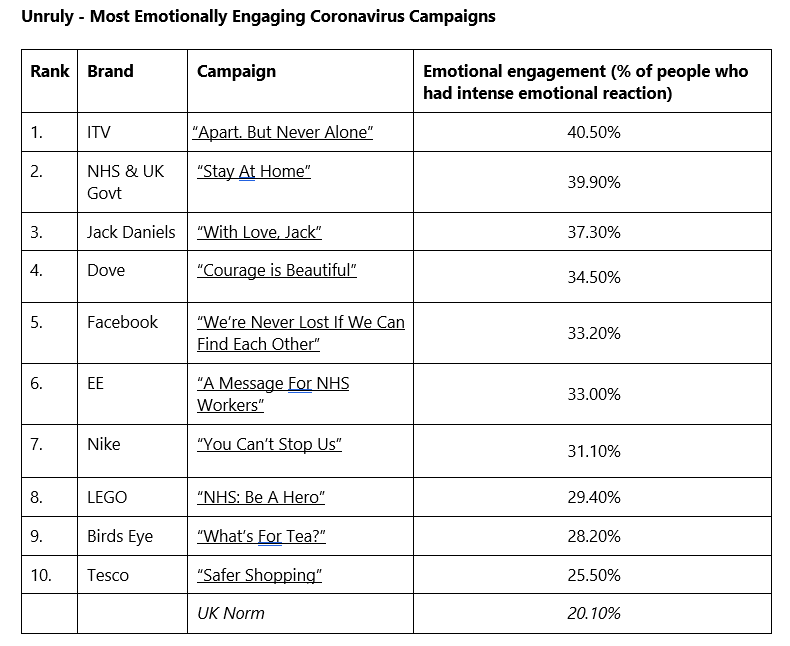
The study from video ad tech company Unruly measured UK consumers’ emotional responses to brands’ COVID-19 campaigns using its emotional testing and targeting tool, UnrulyEQ, to see which ads are generating the most intense levels of positivity.
The TV channel’s campaign, featuring celebs Gordon Ramsay and Davina McCall urging people to stay at home, attracted the most intense positive emotions among ads created in response to the COVID-19 pandemic.
ITV’s spot finished top after 40.5% of UK viewers were intensely moved by the content, this is more than twice the UK norm. NHS’s “Stay At Home” and Jack Daniels’ ”With Love, Jack” took the second and third place, respectively.
As advertisers struggle to navigate the impact of the global spread of the coronavirus, making sure a brand’s content hits the right emotional tone and message during these uncertain times has never been more important. To help, Unruly, part of Tremor International, is measuring consumers’ emotional responses to brands’ COVID-19 campaigns using its emotional testing and targeting tool, UnrulyEQ, to see which ads are generating the most intense levels of positivity.
ITV’s spot, created by creative shop Uncommon, finished top after 40.5% of viewers were intensely moved by the content — more than twice the UK norm. That put it just ahead of the NHS’s “Stay At Home” and Jack Daniels’ ”With Love, Jack” in second and third respectively.
As well as generating intense emotions, ITV’s ad also left 39% of viewers having a more favourable view of the brand — 35% higher than the UK average. However, the ad that scored the highest for brand favourability was the NHS’s “Stay At Home’, which left more than half of viewers (53.7%) with a more favourable perception of the brand.
Rebecca Waring, Unruly’s Global VP, Insight & Solutions, said: “ITV’s ad resonated because people loved seeing celebrities and normal people coming together with one uplifting message. Viewer comments referred to the familiar faces in the video, and how genuine each person seemed, creating a sense of warmth and solidarity. In our UK consumer survey, nearly a quarter of people said they looked to brands to provide a sense of continuity, which explains why viewers found the familiar faces in ITV’s ad so reassuring. However, more than half of respondents didn’t remember the brand.”

Dove’s heartfelt campaign “Courage is Beautiful”, created by Ogilvy, Canada as a tribute to healthcare workers in North America, was fourth despite not being distributed in the UK, with Facebook fifth.
Other ads that made the top 10 include EE, Nike and Birds Eye, while ads from Sainsbury’s and McDonald’s just missed out. However, average emotional engagement across all of the COVID-19 campaigns (28.4%) is also well above the UK norm (20.1%), and slightly higher than the average for UK Xmas campaigns in 2019 (27.6%).
Waring added: “From the results we’re seeing so far, COVID campaigns are more emotive than the norm. But advertisers need to be aware that many of the coronavirus ads we’ve seen so far feature similar messages and emotional tones, which may lead to viewer fatigue and low recall. To avoid this, brands need to ensure their ads are strongly branded and their brands are central to the storyline, not an afterthought. People are looking to brands to provide a sense of continuity, and your distinctive brand voice has an important part to play.”
In a recent consumer survey carried out by Unruly on the kind of content people wanted from brands during the pandemic, warmth and happiness were the most popular emotions, while almost half wanted content that was more informative. ITV’s spot took the top spot after attracting high levels of warmth, happiness and inspiration. The percentage of people who felt informed after watching was also just above the UK norm.
Waring added: “Warmth and happiness were the emotions that came up time and time again in our COVID chart. That’s why Dove’s ‘Courage is Beautiful’ really stood out, with its combination of inspiration, pride and sadness. The key word in qualitative feedback was ‘show’, whereas for most other videos we tested it was ‘people’. Dove had a very specific message, represented by variations on a single image, and this clearly struck home. Due to this, I would expect Dove to be one of the most memorable brands from this period.
“According to our consumer survey, 42% of people think information is a key requirement in COVID ads. Tesco and Sainsbury’s were the most informative brands, and provide an interesting comparison as they both demonstrate similar safety measures implemented in their supermarkets. Sainsbury’s video was purely factual and used animation, where Tesco’s was far more personal, with smiling staff speaking to camera and showing viewers around the shop. Tesco was one of the top performers in our chart when it came to brand favourability, which shows that useful information plus emotional delivery is a winning combination.”
Methodology
Unruly analysed the emotional responses of 2,264 UK consumers to 16 Coronavirus campaign ads using its content measurement tool, UnrulyEQ. The results were then ranked and compared to Unruly’s database of thousands of ads. Each emotion is scored out of 10, with responses that score 8-10 considered ‘intense’. Unruly will continue to test COVID campaigns throughout the pandemic.
